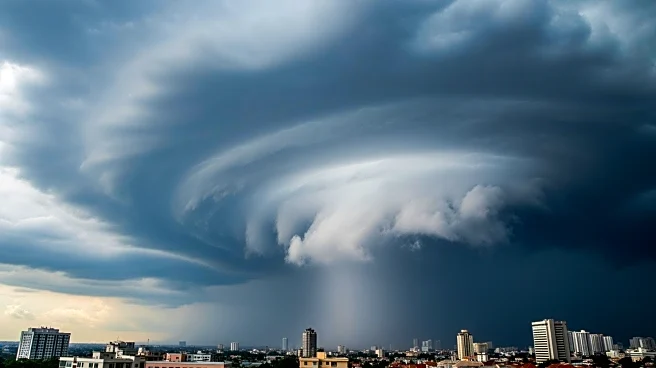What's Happening?
Hurricane Melissa, which recently impacted the Caribbean, has been analyzed by researchers from World Weather Attribution, who found that climate change significantly intensified the storm's effects. The
study revealed that Melissa had 7 percent stronger wind speeds and 16 percent more intense rainfall compared to similar storms in a world unaffected by fossil fuel-induced warming. The hurricane made landfall in Jamaica as a Category 5 storm, with wind speeds reaching 185 miles per hour, causing widespread destruction and internet outages. It then moved to Cuba as a Category 3 storm, prompting evacuations, and hit Haiti with severe flooding, resulting in numerous fatalities.
Why It's Important?
The findings underscore the growing impact of climate change on extreme weather events, highlighting the increased risks and potential damages associated with hurricanes. The intensified wind speeds and rainfall linked to global warming can lead to more severe destruction, posing significant challenges for affected regions, particularly those with limited economic resources. The economic implications are substantial, with estimates suggesting that the enhanced wind speeds could have added over a billion dollars in damages, a considerable burden for countries with smaller GDPs. This analysis emphasizes the need for enhanced climate resilience and adaptation strategies to mitigate future impacts.
What's Next?
As the economic toll of Hurricane Melissa continues to be assessed, affected countries may seek international aid and support to recover from the damages. The study's findings could influence policy discussions on climate change adaptation and disaster preparedness, potentially leading to increased investment in infrastructure and early warning systems. Additionally, the research may prompt further scientific investigations into the relationship between climate change and hurricane intensity, contributing to more accurate predictive models and risk assessments.
Beyond the Headlines
The study raises ethical considerations regarding the responsibility of industrialized nations in contributing to climate change and the disproportionate impact on vulnerable regions. It also highlights the need for global cooperation in addressing climate-related challenges and supporting affected communities. Long-term shifts in weather patterns due to climate change could lead to more frequent and severe hurricanes, necessitating a reevaluation of current environmental policies and international agreements.










